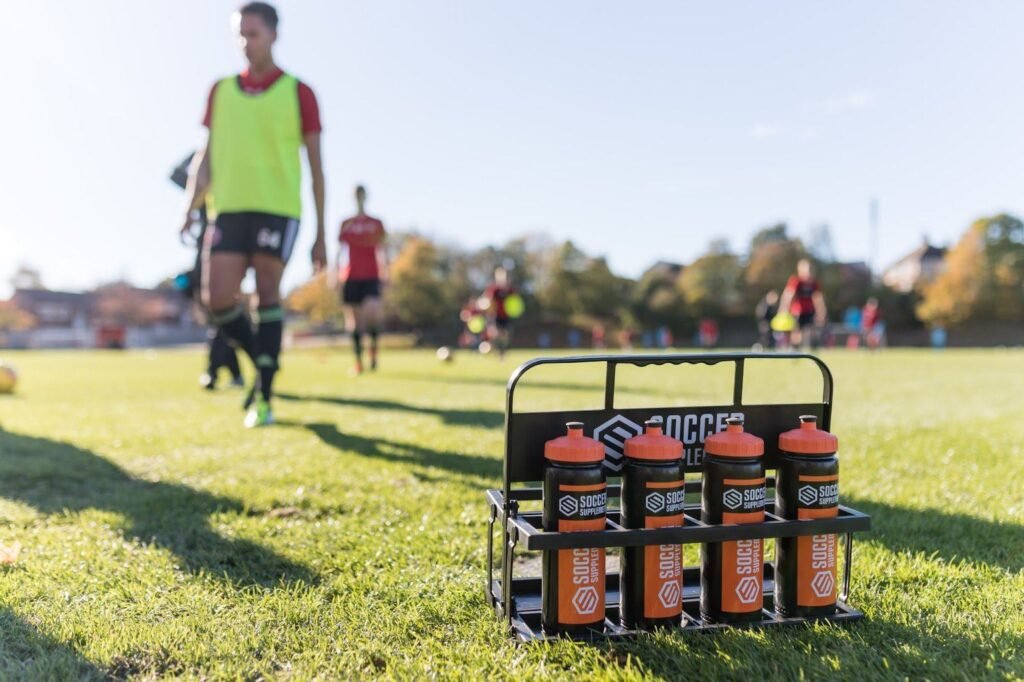Football is a physically demanding sport that requires players to be at their best both physically and mentally.
Proper health and nutrition play a crucial role in ensuring that players can perform at their highest level, recover quickly, and maintain their overall well-being. This blog delves into the importance of health and nutrition for football players, providing insights into the best practices for maintaining optimal performance on and off the field.

The Importance of Nutrition in Football
Nutrition is the cornerstone of athletic performance. For football players, it is essential to consume a balanced diet that provides the energy, nutrients, and hydration needed for training, matches, and recovery. Proper nutrition supports muscle development, enhances endurance, and helps prevent injuries. It also plays a key role in maintaining focus and cognitive function, which are critical for strategic gameplay.
Macronutrients: The Building Blocks of Performance
Carbohydrates: Carbohydrates are the primary source of energy for football players. They are stored as glycogen in muscles and liver, providing the fuel needed for high-intensity activities. Players should focus on consuming complex carbohydrates such as whole grains, fruits, vegetables, and legumes. These foods provide a steady release of energy, helping to sustain performance throughout a match.
Proteins: Proteins are essential for muscle repair and growth. Football players experience significant muscle breakdown during training and matches, making protein intake crucial for recovery. Good sources of protein include lean meats, fish, dairy products, eggs, and plant-based options like beans, lentils, and tofu. It is recommended that players consume a protein-rich meal or snack within 30 minutes post-exercise to support muscle repair.
Fats: Healthy fats are vital for overall health and can provide a secondary source of energy. Unsaturated fats, found in foods like avocados, nuts, seeds, and olive oil, are beneficial for heart health and should be included in a football player’s diet. However, players should limit saturated and trans fats, which are found in processed foods and can negatively impact health and performance.
Micronutrients: Supporting Optimal Function
Vitamins and Minerals: These are crucial for various bodily functions, including energy production, immune function, and bone health. Key vitamins for football players include Vitamin D (for bone health), Vitamin C (for immune function), and B vitamins (for energy metabolism). Essential minerals include iron (for oxygen transport), calcium (for bone strength), and magnesium (for muscle function).
Hydration: Adequate hydration is essential for maintaining performance and preventing heat-related illnesses. Football players should aim to stay well-hydrated before, during, and after training sessions and matches. Water is the best choice for hydration, but during intense activity, electrolyte-rich drinks can help replace lost salts and minerals.
Pre-Match Nutrition: Fueling Up
What a player eats before a match can significantly impact their performance. The goal is to maximize glycogen stores and ensure the body is well-hydrated.
Pre-Match Meal
A pre-match meal should be consumed about 3-4 hours before kickoff. It should be high in carbohydrates, moderate in protein, and low in fat and fiber to prevent gastrointestinal discomfort. An example of a good pre-match meal includes:
- Grilled chicken breast
- Brown rice or whole-grain pasta
- Steamed vegetables
- A piece of fruit
- Water or an electrolyte drink
Snacks
If there is less time before the match, players can consume a lighter snack 1-2 hours prior. Good options include:
- A banana or an apple
- A handful of nuts
- A yogurt with some honey
- A smoothie with fruits and a scoop of protein powder
During the Match: Maintaining Energy Levels
During a match, it is crucial to maintain energy levels and hydration. Players can consume small amounts of easily digestible carbohydrates, such as energy gels or sports drinks, especially during halftime. Staying hydrated by drinking water or an electrolyte beverage is also essential to prevent dehydration and cramping.
Post-Match Nutrition: Recovery and Repair
Recovery nutrition is vital for repairing muscles, replenishing glycogen stores, and rehydrating the body. The post-match meal should be consumed within 30 minutes to 2 hours after the match for optimal recovery.
Post-Match Meal
A post-match meal should include a mix of carbohydrates, protein, and fats. Good options include:
- A turkey or chicken sandwich on whole-grain bread with vegetables
- A quinoa salad with mixed vegetables and a lean protein source
- A smoothie with fruits, vegetables, Greek yogurt, and a scoop of protein powder
- A stir-fry with lean beef, mixed vegetables, and brown rice
Hydration
Rehydration is equally important. Players should aim to drink plenty of water and can include an electrolyte beverage to replace lost salts and minerals. Monitoring urine color can be a simple way to assess hydration status—pale yellow indicates adequate hydration.
Supplements: Enhancing Performance and Recovery
While a balanced diet should provide most of the nutrients needed, some football players may benefit from supplements. It is important to consult with a nutritionist or healthcare provider before starting any supplement regimen.
Protein Supplements: Whey protein or plant-based protein powders can be convenient options for meeting protein needs, especially post-exercise.
Creatine: Creatine can help improve strength, power, and muscle mass, making it beneficial for football players who engage in high-intensity activities.
Multivitamins: A high-quality multivitamin can help fill any gaps in a player’s diet, ensuring they receive all necessary vitamins and minerals.
Omega-3 Fatty Acids: These can help reduce inflammation and support heart health. Fish oil supplements are a common source.
Electrolyte Supplements: These can be useful for maintaining hydration, especially during long training sessions or matches in hot climates.

Special Considerations
Individual Needs
Each football player is unique, and their nutritional needs may vary based on factors such as age, gender, body composition, training intensity, and overall health. Working with a sports nutritionist can help tailor a nutrition plan to meet individual needs and goals.
Managing Injuries
Nutrition also plays a role in injury management and recovery. A diet rich in anti-inflammatory foods, such as fruits, vegetables, fatty fish, and nuts, can help reduce inflammation and speed up the healing process. Adequate protein intake is essential for tissue repair, and vitamins such as Vitamin C and D, as well as minerals like zinc, play a role in recovery.
Mental Health
Mental health is as important as physical health for football players. Nutrition can impact mental well-being, with a balanced diet supporting mood and cognitive function. Foods rich in omega-3 fatty acids, antioxidants, and B vitamins are particularly beneficial for brain health.
Practical Tips for Football Players
Plan Ahead: Preparing meals and snacks in advance can help ensure that players always have healthy options available, even with a busy schedule.
Stay Consistent: Consistency is key. Maintaining a balanced diet and proper hydration every day, not just on match days, supports overall health and performance.
Listen to Your Body: Players should pay attention to how different foods and hydration strategies make them feel and adjust accordingly.
Stay Educated: Staying informed about nutrition and its impact on performance can help players make better choices and continually improve their health and performance.
Conclusion
Health and nutrition are fundamental to the success and longevity of football players. By focusing on a balanced diet rich in essential nutrients, staying hydrated, and considering individual needs and circumstances, players can optimize their performance, recover effectively, and maintain their overall well-being. Whether you’re a professional athlete or an amateur enthusiast, proper nutrition can make a significant difference in your game. Invest in your health, and the results will show on the field.





